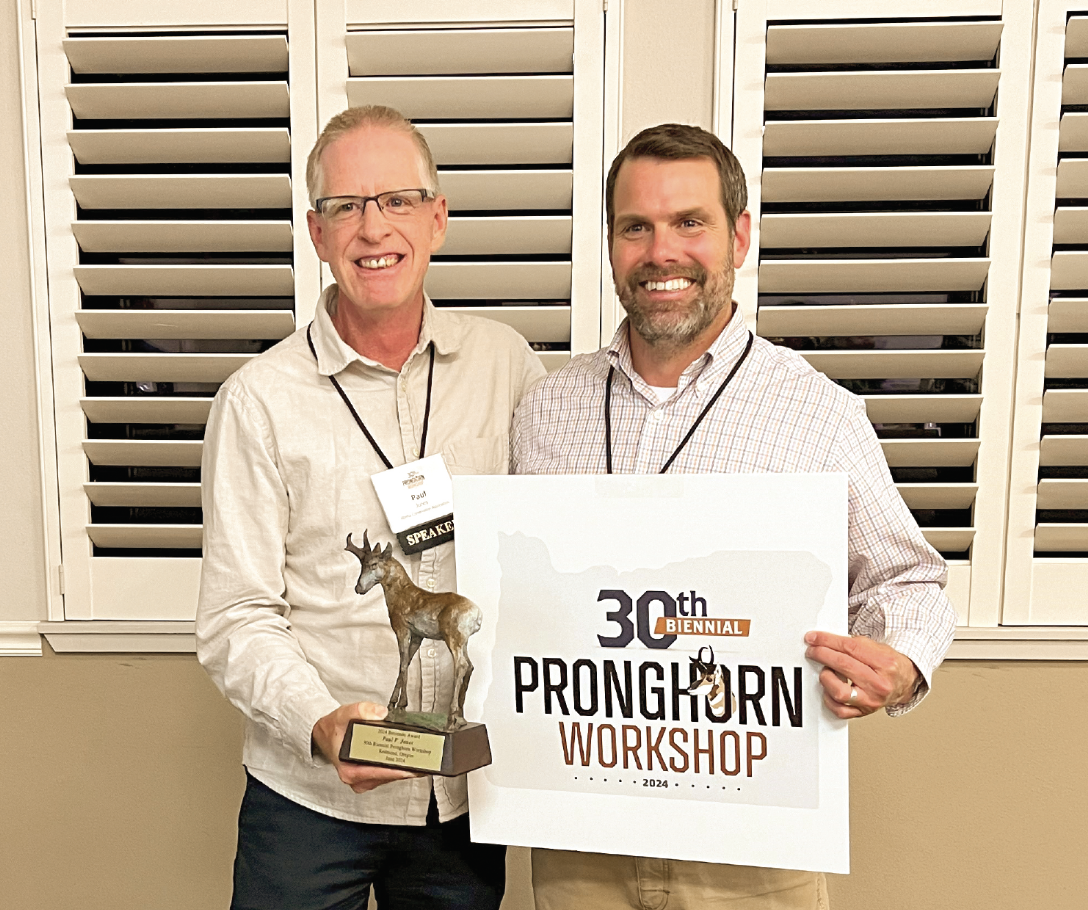
5 minute read
Paul Jones Honoured with the 2024 Berrendo Award
► by Tara Holmwood
Berrendo—derived from the Spanish word for pronghorn—is not only a fun word to bellow, it is a prestigious award within the wildlife conservation community.

The Award
The Berrendo Award recognizes remarkable contributions to pronghorn ecology and management and is presented at the Western Association of Fish and Wildlife Agencies’ (WAFWA) Biennial Pronghorn Workshop. This award not only celebrates individual achievements, but also reflects the legacy and contemporary challenges faced by pronghorn and those dedicated to their conservation.
In 2024, Paul Jones, senior biologist with Alberta Conservation Association (ACA), was honoured as the youngest recipient and the first Canadian to win the award. Dr. Andrew Jakes, a friend and Senior Research Scientist with Wyoming Migration Initiative – Wyoming Cooperative Fish and Wildlife Research Unit, presented Paul with the award, praising his dedication and integrity.
“I’ve had the privilege and honour to work with Paul over the last 18 years,” says Dr. Jakes. “He epitomizes what it means to be a pronghorn researcher and conservationist.”
Several nomination letters from esteemed colleagues also highlighted Paul’s impact on pronghorn research and management. ACA staff describe him as a humble collaborator, recognizing his tendency to share credit with others, and acknowledging his undeniable influence on wildlife conservation.
Dr. Mark Boyce, Professor of Ecology, and ACA Chair in Fisheries & Wildlife, states, “Paul Jones has been the most effective voice for pronghorn conservation in Canada and his influence has extended beyond provincial borders.”
Tracy Lee, Director of Conservation Research at Miistakis Institute, describes him as, “a truly wonderful person, he is collaborative in nature, kind and hard working.”
His experience winning WAFWA awards actually began in 2016, when he received two special recognition awards—first for co-authoring the revised management guides and bibliography, and secondly for his efforts to implement a long-term transboundary effort to conserve prairie wildlife including pronghorn.
The Dream
Growing up, Paul always wanted to be an ungulate biologist, “My passion is ungulates.”
He began his dream-driven journey at ACA in 1998. After completing his master’s degree in Hinton, Paul migrated back to Lethbridge where he had earned his undergraduate degree. “Pronghorn started as a small part of my work, but then I built it into what it is now,” he says. Paul sees parallels between his position with ACA and his work on pronghorn, “Both my position and work on pronghorn started off meagrely, but over time both have grown to where they are no longer a position with duties, or simply a career, but a passion.”
“I can remember driving west of Milk River on Highway 501 and seeing my first pronghorn,” recollects Paul. “I pulled the truck over and grabbed my binoculars. When I was done watching them, I looked back at the truck and it was actually parked partially in the middle of the road!”
The Work
While Paul won the Berrendo Award, the true winners are North American pronghorn, also known as prairie speedsters, prairie ghosts, or speed goats. His work focuses on fence ecology, resource selection, migration, and movement permeability. Recognizing that pronghorn prefer crawling under fences to conserve energy, Paul helped initiate the wildlife-friendly fencing project to modify barbed wire fences, enhancing wildlife migration and movement. The massive initiative consists of removing the bottom barbed wire from fences and installing a smooth wire with 18 inches of clearance—throughout the Prairies! Paul’s research indicated that height matters and by raising the bottom wire to 18 inches allowed easier passage under the fence. Over the years, this project has improved the migratory pathways for not only pronghorn but other ungulates as well, leading to the development of guidelines referenced by government agencies and conservation organizations across western North America.
Dr Jakes notes, “Paul’s research using Northern Sagebrush Steppe pronghorn data for meta-analyses has revealed that these migrations are some of the longest and intact ungulate migrations, globally, which serve as a scientific foundation for continued collaborative success.”
Paul’s lifelong dedication to pronghorn research is evident in his extensive publications, further solidifying his reputation. Although Paul did not author the comprehensive “bible” of pronghorn management, he has co-authored over 30 publications on pronghorn conservation. In 2008, Paul officially became the third pronghorn amigo—each representing a country in North America that pronghorn call home—to revise the pronghorn management guides as well as develop the pronghorn bibliography. The other two amigos are Jim Yoakum from the U.S. (the first recipient of the Berrendo in 2002) and Jorge Cancino from Mexico (the 2016 award recipient).
The Godfather
Paul is recognized as an authority on pronghorn ecology. His efforts also extend to species-at-risk management and enhancing native prairie restoration. Paul’s research emphasizes practical applications, facilitating collaboration with private landowners to foster conservation.
In 2002, Paul played a pivotal role in establishing ACA’s MULTISAR project, earning him the nickname “the godfather.” This initiative resulted in several partnerships, collaborating with over 175 landowners to conserve more than 900,000 acres of land in Alberta.
Receiving the Berrendo is pretty special for Paul, who views it as motivation to continue his work. “I've been recognized for my work. Now I want to make sure it is not the pinnacle but instead serves as motivation to keep doing the work,” he reflects. He stresses that this award reinforces both his and ACA's reputation as leading experts on pronghorn conservation. He adds, “The work we are doing has scientific merit from a larger community, not just within Alberta.”
Known for his unwavering commitment, colleagues joke that they might find him at his laptop working on a paper or presentation into his 80s. As long as he continues to work with pronghorn, his passion remains strong, and retirement is not part of his plan.
Learn More
Paul’s work (visit ACA’s Peer Reviewed Publications website and type “Jones” in the search bar): ab-conservation.com/ publications/peer-reviewed-publications
MULTISAR: multisar.ca
WAFWA workshop: wafwa.org/workshops/ pronghorn-workshop
Alberta Landholder's Guide to Wildlife Friendly Fencing: ab-conservation.com/downloads/educational_materials/ brochures/ACA_Wildlife_Friendly_Fencing.pdf










